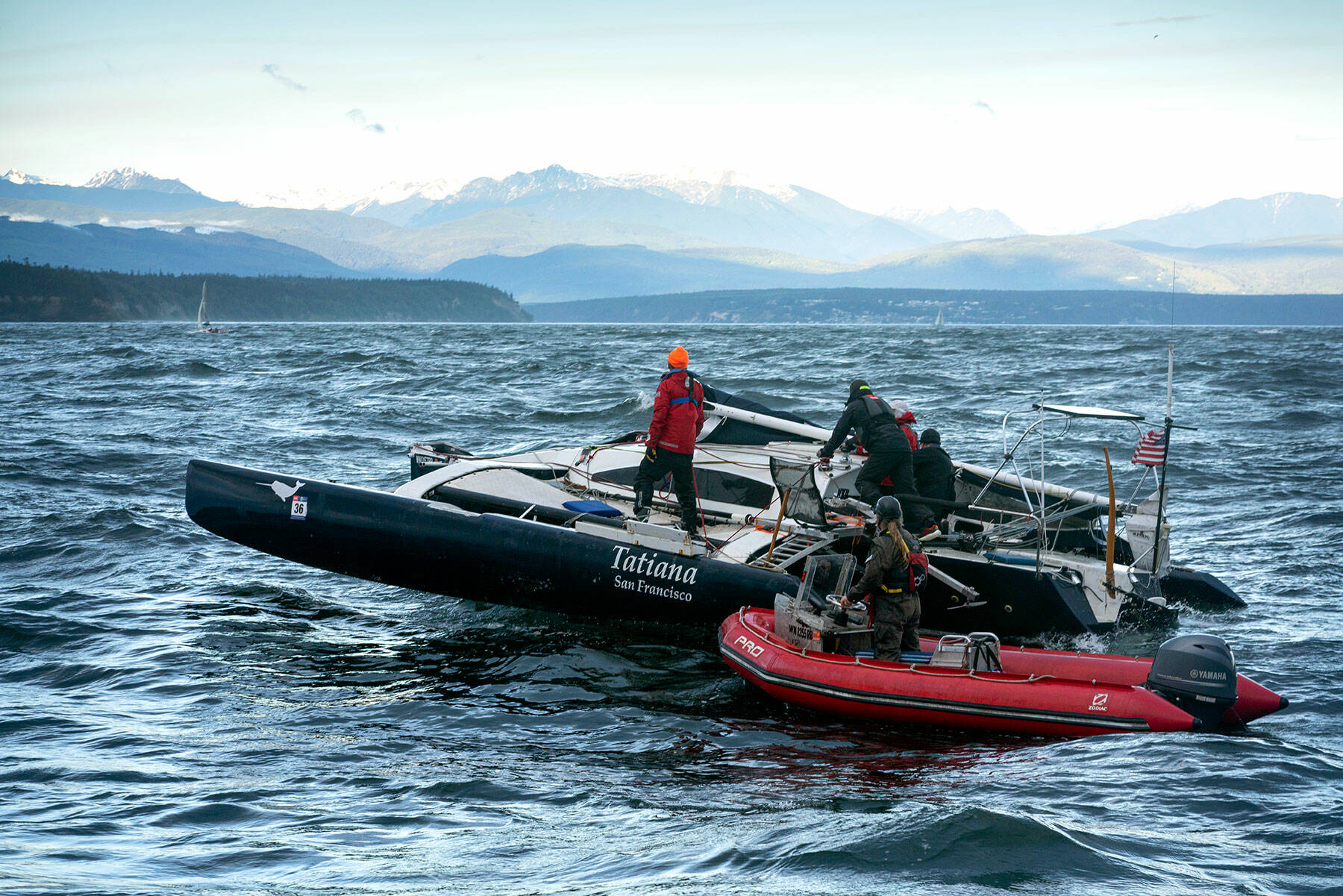PORT ANGELES — Rough seas and high winds continued to thwart competitors in the Race to Alaska that began Monday when a Coast Guard advisory restricted crossings Tuesday.
On Monday, the U.S. Coast Guard and a standby safety boat rescued four people from the Strait of Juan de Fuca when three boats capsized and one lost its mast on the first day of the 750-mile Race to Alaska.
The stage from Port Townsend to Victoria, called the “Proving Ground,” began Monday under a gale warning and a small craft advisory that forced some teams to seek shelter on Protection Island and Dungeness Spit.
Team Mustang Survival’s Rite of Passage were one of about six teams that did not even leave the Northwest Maritime Center dock in Port Townsend Bay on the start day.
Team Mustang Survival’s Rite of Passage, whose average age is less than 17, chose to head out Tuesday morning, but anchored at Dungeness Spit when the Coast Guard issued its advisory. They planned to head out at first light today, said Elizabeth Dougherty, the mother of one of the sailors, in an email.
Northwest Maritime Center, which organizes the Race to Alaska, had extended the time competitors were given to reach Victoria from the usual 36 hours to 60 hours due, according to its website at nwmaritime.org, to “a weather forecast between seasick and dangerous.”
The extra 24 hours after the 5 a.m. start was intended to reduce pressure on the teams navigating the 40 miles across the Strait of Juan de Fuca to race in unsafe conditions.
When she learned the time had been extended, Lillian Kuehl decided she wouldn’t try to cross the Strait in one attempt. She oared her 18-foot rowboat, which she built in Port Angeles, 1 1/2 miles to Fort Worden State Park, where she could sit on a warm beach with a gentle breeze and monitor the weather.
“It’s going to be better to wait for the wind to die down rather than head out today if it’s going to be bad,” Kuehl said, “especially when you see what happened to those other boats.”
The 10-foot seas and 20 knot winds Monday tested the skills of participants and the seaworthiness of vessels.
The U.S. Coast Guard Air Station Port Angeles received the first notification from a racer’s personal locater beacon at about 7:30 a.m. Monday, said Steve Strohmaier, a public affairs specialist with the U.S. Coast Guard.
A 45-foot rescue boat pulled one person out of the cold, choppy water and an MH-65 Dolphin helicopter hoisted two men who had been tossed from their boat. All were transported to the air station and treated by emergency medical technicians.
A fourth racer was picked up by one of the Race to Alaska’s seven support vessels and transported to Port Townsend.
Boats that capsized were B Team, a Weta Trimaran from Forestville, Calif.; Team Razzle Dazzle, an 18-foot Angus RowCruiser from Savannah, Ga; and Runaway Redux, a 14-foot C-Lark from Palm Vay, Fla. Team Narwhal, a 32-foot Farrier from Seattle, dismasted and was towed to shore.
As of late Wednesday, nine teams had dropped out of the race, including the four boats disabled Monday.
First-stage winner
The Seattle-based Team Pure and Wild, a 44-foot monohull, won the first stage by arriving in Victoria at 9:38 a.m. Monday — more than 20 minutes ahead of second-place finisher Team Pestou from Victoria that arrived at 10:02 a.m. that day.
Third-place finisher Ruf Duck from Seattle arrived at 10:16 a.m. and Pturbodactyl from Salt Spring Island, B.C., arrived at 10:20 a.m.
The Race to Alaska bills itself as “North America’s longest human and wind powered race” and returns after a two-year COVID-19 hiatus.
No motors or support, like food and supply drops, are allowed. Since the first Race to Alaska in 2015, first prize remains $10,000 and second prize is a set of steak knives.
The second stage, called “To the Bitter End,” starts at noon Thursday in Victoria and continues the 710 miles to Ketchikan.
________
Paula Hunt can be reached at 360-425-2345, ext. 50583, or by email at paula.hunt@peninsuladailynews.com.

